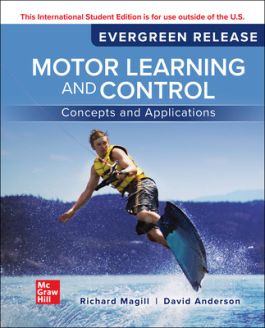Motor Learning and Control: Concepts and Applications: 2024 Release ISE
1264493592
·
9781264493593
Magill’s Motor Learning and Control: Concepts and Applications introduces the study of motor learning and control to students pursuing careers in exercise science, physical education, and other movement-oriented fields. Each chapter presents motor …
Leer Más
PRODUCTO DIGITAL EBOOK. NO ES UN PRODUCTO FÍSICO.
Gracias este es un libro electrónico o EBOOK, para poder utilizarlo debes de crear una cuenta en VitalSource Bookshelf esta es una Aplicación Gratis. Una vez que has creado tu cuenta, dentro de la plataforma debes de redimir los distintos códigos que hayas adquirido para poder leer tus libros.- Ingresa a tu libro desde cualquier lugar o dispositivo, con acceso a internet o sin acceso.
- Crear notas, y apuntes en tus lecturas.
- Puedes realizar búsquedas a los conceptos que necesites de manera rápida y fácil.
- Ingresa a tu libro desde cualquier lugar o dispositivo, con acceso a internet o sin acceso.
- Crear notas, y apuntes en tus lecturas.
- Puedes realizar búsquedas a los conceptos que necesites de manera rápida y fácil.
Unit 1 Introduction to Motor Skills and Abilities
CHAPTER 1: The Classification of Motor Skills
CHAPTER 2: The Measurement of Motor Performance
CHAPTER 3: Motor Abilities
Unit 2 Introduction to Motor Control
CHAPTER 4: Neuromotor Basis for Motor Control
CHAPTER 5: Motor Control Theories
CHAPTER 6: Sensory Components of Motor Control
CHAPTER 7: Performance and Motor Control Characteristics of Functional Skills
CHAPTER 8: Action Preparation
Unit 3 Attention and Memory
CHAPTER 9: Attention as a Limited Capacity Resource
CHAPTER 10: Memory Components, Forgetting, and Strategies
Unit 4 Introduction to Motor Skill Learning
CHAPTER 11: Defining and Assessing Learning
CHAPTER 12: The Stages of Learning
CHAPTER 13: Transfer of Learning
Unit 5 Instruction and Augmented Feedback
CHAPTER 14: Demonstration and Verbal Instructions
CHAPTER 15: Augmented Feedback
Unit 6 Practice Conditions
CHAPTER 16: Practice Variability and Specificity
CHAPTER 17: The Amount and Distribution of Practice
CHAPTER 18: Whole and Part Practice
CHAPTER 19: Mental Practice
CHAPTER 1: The Classification of Motor Skills
CHAPTER 2: The Measurement of Motor Performance
CHAPTER 3: Motor Abilities
Unit 2 Introduction to Motor Control
CHAPTER 4: Neuromotor Basis for Motor Control
CHAPTER 5: Motor Control Theories
CHAPTER 6: Sensory Components of Motor Control
CHAPTER 7: Performance and Motor Control Characteristics of Functional Skills
CHAPTER 8: Action Preparation
Unit 3 Attention and Memory
CHAPTER 9: Attention as a Limited Capacity Resource
CHAPTER 10: Memory Components, Forgetting, and Strategies
Unit 4 Introduction to Motor Skill Learning
CHAPTER 11: Defining and Assessing Learning
CHAPTER 12: The Stages of Learning
CHAPTER 13: Transfer of Learning
Unit 5 Instruction and Augmented Feedback
CHAPTER 14: Demonstration and Verbal Instructions
CHAPTER 15: Augmented Feedback
Unit 6 Practice Conditions
CHAPTER 16: Practice Variability and Specificity
CHAPTER 17: The Amount and Distribution of Practice
CHAPTER 18: Whole and Part Practice
CHAPTER 19: Mental Practice
Magill’s Motor Learning and Control: Concepts and Applications introduces the study of motor learning and control to students pursuing careers in exercise science, physical education, and other movement-oriented fields. Each chapter presents motor learning and control as a set of principles and guidelines based on research evidence. Recent scholarship is interpreted and used to explore core concepts and basic theory. Application Problems guide students to consider real-world applications of the theory and research they have studied. The authors’ clear writing style and practical applications will help students build a solid foundation and prepare them for further exploration on their own.

